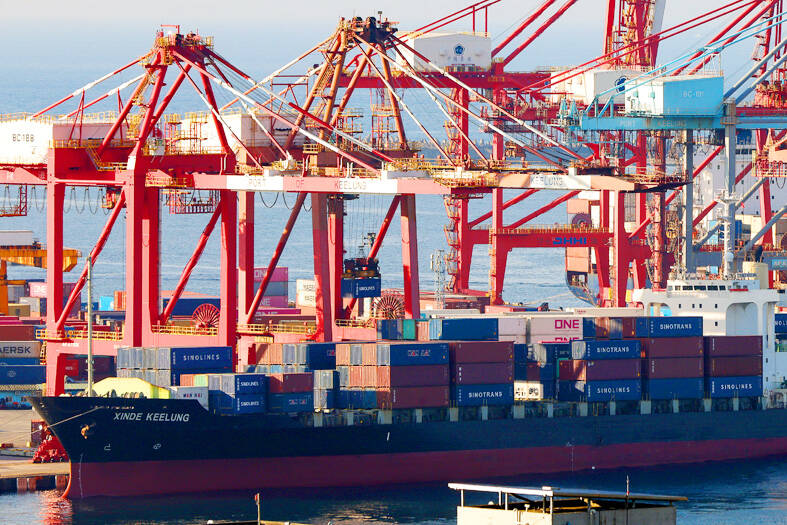The Directorate-General of Budget, Accounting and Statistics (DGBAS) yesterday upgraded its first-quarter GDP growth expectation for Taiwan to 5.37 percent after in February estimating 3.46 percent for the period.
The upgrade reflects stronger-than-expected exports due to demand for technology goods, and solid capital formation on the part of the government, public enterprises and private firms, the agency said in a statement.
“Due to the strong demand for electronic, and information and communications products, real exports of goods and services grew by 20.11 percent year-on-year” in the first quarter, the statement said, adding that “imports also grew by 23.66 percent year-on-year.”

Photo: Ritchie B. Tongo, EPA-EFE
“Regarding gross capital formation, investments in machinery equipment, construction and intellectual property products increased,” it said.
Combining inventory changes, real gross capital formation expanded 14.72 percent year-on-year, it said.
The 5.37 percent GDP growth in the January-to-March quarter accelerated from 2.90 percent in the previous quarter and marked the strongest expansion since the first quarter last year, when it was 6.64 percent, DGBAS data showed.
The agency’s preliminary GDP data, which are to be revised after more data are collected in the coming weeks, exceeded Yuanta Securities Investment Consulting Co’s (元大投顧) forecast of 4.2 percent.
“Exports of artificial intelligence-related goods are booming and uncertainty over US tariffs has led manufacturers to front-load goods in advance, while firms continue to invest in advanced semiconductor process technologies and a stable labor market supports domestic consumption,” Yuanta said of its prediction in a note ahead of the DGBAS statement.
In February, the DGBAS forecast Taiwan’s full-year economic growth would be 3.14 percent.
However, several research institutes in the past few weeks revised their predictions to below 3 percent, citing US tariff concerns and shifting dynamics in global trade.
US President Donald Trump on April 2 imposed a 32 percent “reciprocal” tariff on Taiwan, but on April 9 paused it for 90 days, although a 10 percent baseline tariff remains in place.
The initial tariffs would still have a substantial effect on growth, given Taiwan is a trade-reliant economy and the US accounted for 23.4 percent of Taiwan’s overall exports last year.
The Chung-Hua Institution for Economic Research (中華經濟研究院) last month cut its full-year GDP growth forecast to 0.16 percent in the worst-case scenario.
Last week, the IMF forecast that Taiwan’s economy would grow 2.9 percent, while S&P Global predicted 2.1 percent GDP growth this year.
If growth rates in the final three quarters follow the DGBAS’ forecasts, this year’s GDP growth would be 3.6 percent, the agency said yesterday, although the projection did not take into account the effects of US tariffs.
The agency is scheduled to update its full-year GDP growth data at the end of this month.

A Ministry of Foreign Affairs official yesterday said that a delegation that visited China for an APEC meeting did not receive any kind of treatment that downgraded Taiwan’s sovereignty. Department of International Organizations Director-General Jonathan Sun (孫儉元) said that he and a group of ministry officials visited Shenzhen, China, to attend the APEC Informal Senior Officials’ Meeting last month. The trip went “smoothly and safely” for all Taiwanese delegates, as the Chinese side arranged the trip in accordance with long-standing practices, Sun said at the ministry’s weekly briefing. The Taiwanese group did not encounter any political suppression, he said. Sun made the remarks when

The Taiwanese passport ranked 33rd in a global listing of passports by convenience this month, rising three places from last month’s ranking, but matching its position in January last year. The Henley Passport Index, an international ranking of passports by the number of designations its holder can travel to without a visa, showed that the Taiwan passport enables holders to travel to 139 countries and territories without a visa. Singapore’s passport was ranked the most powerful with visa-free access to 192 destinations out of 227, according to the index published on Tuesday by UK-based migration investment consultancy firm Henley and Partners. Japan’s and

BROAD AGREEMENT: The two are nearing a trade deal to reduce Taiwan’s tariff to 15% and a commitment for TSMC to build five more fabs, a ‘New York Times’ report said Taiwan and the US have reached a broad consensus on a trade deal, the Executive Yuan’s Office of Trade Negotiations said yesterday, after a report said that Washington is set to reduce Taiwan’s tariff rate to 15 percent. The New York Times on Monday reported that the two nations are nearing a trade deal to reduce Taiwan’s tariff rate to 15 percent and commit Taiwan Semiconductor Manufacturing Co (TSMC, 台積電) to building at least five more facilities in the US. “The agreement, which has been under negotiation for months, is being legally scrubbed and could be announced this month,” the paper said,

MIXED SOURCING: While Taiwan is expanding domestic production, it also sources munitions overseas, as some, like M855 rounds, are cheaper than locally made ones Taiwan and the US plan to jointly produce 155mm artillery shells, as the munition is in high demand due to the Ukraine-Russia war and should be useful in Taiwan’s self-defense, Armaments Bureau Director-General Lieutenant General Lin Wen-hsiang (林文祥) told lawmakers in Taipei yesterday. Lin was responding to questions about Taiwan’s partnership with allies in producing munitions at a meeting of the legislature’s Foreign Affairs and National Defense Committee. Given the intense demand for 155mm artillery shells in Ukraine’s defense against the Russian invasion, and in light of Taiwan’s own defensive needs, Taipei and Washington plan to jointly produce 155mm shells, said Lin,